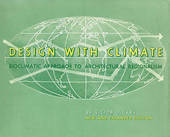
|
Design with Climate: Bioclimatic Approach to Architectural Regionalism - New and expanded Edition
Paperback / softback
Main Details
| Title |
Design with Climate: Bioclimatic Approach to Architectural Regionalism - New and expanded Edition
|
| Authors and Contributors |
By (author) Victor Olgyay
|
|
Contributions by Donlyn Lyndon
|
|
Contributions by Victor Olgyay
|
|
Contributions by John Reynolds
|
|
Contributions by Ken Yeang
|
| Physical Properties |
| Format:Paperback / softback | | Pages:224 | | Dimensions(mm): Height 210,Width 260 |
|
| ISBN/Barcode |
9780691169736
|
| Classifications | Dewey:720.47 |
|---|
| Audience | | Tertiary Education (US: College) | | Professional & Vocational | |
|---|
| Edition |
Revised edition
|
| Illustrations |
183 halftones. 173 line illus. 24 tables.
|
|
Publishing Details |
| Publisher |
Princeton University Press
|
| Imprint |
Princeton University Press
|
| Publication Date |
1 September 2015 |
| Publication Country |
United States
|
Description
Architects today incorporate principles of sustainable design as a matter of necessity. But the challenge of unifying climate control and building functionality, of securing a managed environment within a natural setting--and combating the harsh forces of wind, water, and sun--presented a new set of obstacles to architects and engineers in the mid-
Author Biography
Victor Olgyay (1910-70) was associate professor in the School of Architecture and Urban Planning at Princeton University. He was a leading researcher on the relationship between architecture, climate, and energy.
Reviews"Design with Climate has had an extremely important impact on the practice of sustainable design, and is perhaps even more relevant today than when it was when originally published in 1963. In many ways the book was ahead of its time."-Peter Anderson, author of Prefab Prototypes: Site-specific Design for Offsite Construction "Design with Climate is a seminal work of continued relevance, and is especially needed as architects relearn the basics of climatic design in order to right the causes and effects of global warming."-Bruce Haglund, University of Idaho
|